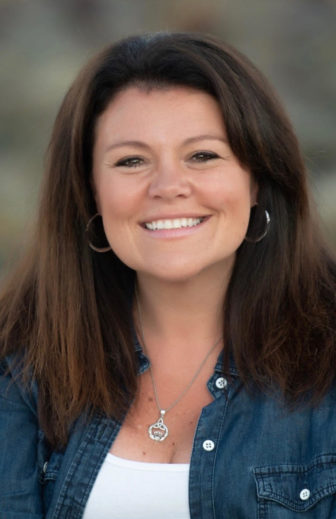Families with loved ones in nursing homes–unable to visit while getting frustratingly sparse information about them–have found a champion in Mairead Painter.
Painter, the state’s long term care ombudsman, who works for the state Department of Aging and Disability Services, launched live chat sessions on Facebook that quickly evolved into a real-time information pipeline for families.
“I was trying to think about how we can reach people. Normally, residents and family members are sometimes the last people to get information,” said Painter, whose office is independent of the state Department of Public Health. “I wasn’t sure anybody would join [the chats]. It was kind of an experiment to see if it would work.”
In mid-March, after the first cases of COVID-19 were reported among nursing home residents, the state barred all visitors except emergency personnel. Families became more anxious as the number of cases and deaths rose in these facilities.

Contributed Photo.
Mairead Painter, the state’s long term care ombudsman, hosts weekly live chats to answer questions about nursing home care.
To date, nursing home deaths account for about 60% of all COVID-19 deaths. As of May 20, nursing home cases total 7,875 and deaths 2,190. Although the weekly number of deaths rose by 263, that was fewer deaths than the prior week.
Nursing homes are “playing catch-up,” trying to keep pace with the day-to-day changes the pandemic brings, Painter said. Some now are making stronger efforts than others to communicate with families, she said.
Painter, who has been ombudsman since May 2018, hosts hour-long Facebook Live sessions at 5:30 p.m. every Monday, Wednesday and Friday on the Connecticut Long Term Care Ombudsman Program Facebook page.
“It’s a blessing, a lifesaver and calming voice during a trying time,” said Carol Zenczak of Enfield, who heard from Painter when she posted a social media comment concerned that her mother’s nursing home was becoming a COVID-19 recovery home. As it turned out, the facility did not become a COVID-19 recovery facility.
The questions posed to Painter run the gamut. In recent sessions, family members have asked: how and when more widespread COVID-19 testing will be available, when facilities might reopen to visitors, whether facilities can add cameras to allow family members to virtually check in on residents, why some facilities are allowing outside “window” visits and others aren’t, whether residents can receive flower deliveries, and how they can get summer clothes to their loved ones.
The chats usually draw between 400 and 600 participants, with one generating close to 1,000 views. They have created a new dynamic, Painter says, where family members sometimes get information from the state even before it’s trickled down to nursing home administrators. A recent chat featured Barbara Cass, who oversees inspections and quality control measures at nursing homes as chief of DPH’s health care quality and safety branch.
The sessions provide more than just a venting session for family members; they have generated some results. After Painter and DPH officials received complaints that family members couldn’t communicate with nursing home residents via video chat, the state distributed 800 iPads to nursing homes May 9. DPH ordered facilities to devise schedules so residents can have 20-minute video chats once a week.
Typically, the ombudsman’s office focuses largely on responding to and investigating complaints by residents, family members and others against long-term care facilities.
Zenczak said, “I have always known about the ombudsman program, but thought you came to use them only in cases of abuse or neglect. Little did I know. With very little communication, although it is getting better, between my mother’s nursing home and those of us on the outside, we are now able to ask for things like window visits, virtual visits, sending care packages through the mail–things I don’t think we would have known we could do if not for people like Mairead.”
Karen Foley of Waterford says she feels lucky that during the 10 years her mother has been at Bayview Health Care Center, she’s never felt the need to contact the ombudsman’s office. “However, I have discovered that this office provides much more than problem resolution,” she said.
“It is a great source of information and support,” she said. “There is a great deal of good collaboration happening, and knowing this has made a difficult situation easier. Mairead’s dedication is so appreciated.”
Liz O. Stern of Stonington, whose mother is in a nursing home, agrees. She spearheads a council that supports families at her mother’s facility.
“She’s a gift,” Stern said of Painter. “What she is doing is beyond what I can put into words, the fact that she can build trust in this climate. I watch her demonstrate genuine empathy but also laced with a lot of realism. She understands what she can do and what she can’t do, and she is not apologetic about what she can’t do. To know her is to have a friend.”
The chats also let family members learn from and exchange information with each other, Painter said. Many are realizing, for instance, that policies can vary widely from facility to facility. Painter hopes her office is giving families knowledge that empower them and hold nursing homes accountable.
“You have to be part of the solution,” she said of her work.